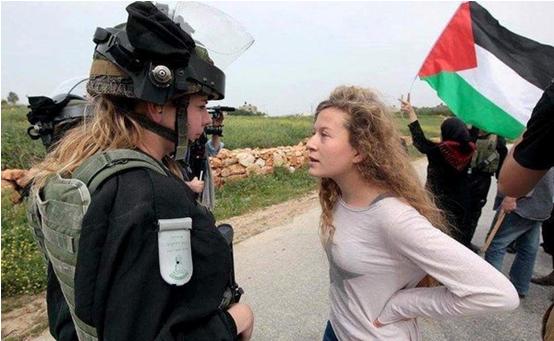Ahed Tamimi, the teenager from Nabi Saleh arrested after a video of her attempting to push two armed Israeli soldiers off of her family’s porch went viral, signed a plea bargain in Israeli military court on Wednesday, March 21, according to which she is to serve eight months in prison, minus the three months time she has already been incarcerated.
Her mother, Nariman, and cousin, Nur, also signed plea bargains. Nariman will serve eight months, and Nur was sentenced to the time she has already served.
The now-famous video of Ahed was filmed days after Israeli soldiers shot her cousin, Mohammed, in the head with a rubber-coated bullet and fractured his skull. An Israeli military court denied bail to Ahed and her mother, Nariman — the latter charged with incitement for livestreaming the video of Ahed and the soldiers — in December.
In court on Wednesday, an Israeli activist present during Nariman’s hearing slapped a military prosecutor and was arrested. The activist reportedly asked the prosecutor after slapping him “Who are you to judge her?”
In late February, the occupation army arrested Ahed’s cousin Mohammed Tamimi — still awaiting surgery to reconstruct the part of his skull that was removed — in a pre-dawn raid. He was interrogated without the presence of a lawyer or parent present, and was released a few hours later after being pressured to confess that his head injury was caused by falling off a bicycle — and not by an Israeli rubber-bullet, fragments of which were extracted from his skull.
According to B’Tselem, the conviction rate in Israel’s military courts in the West Bank is almost 100% — not because the military prosecution is so efficient, but because Palestinian defendants are intimidated into signing plea bargains in which they reluctantly confess guilt. A new report published by B’Tselem shows how the measures that Israel has showcased over the past decade as examples of its improved treatment of Palestinian minors in military courts have little to do with the protection of minors and everything to do with public relations. In fact, the function of the military juvenile court boils down to signing off on plea bargains such as the ones signed by the Tamimis.
A new report published by B’Tselem, Minors in Jeopardy: Violation of the Rights of Palestinian Minors by Israel’s Military Courts, analyzes the changes that Israel has announced during the past decade about the treatment of Palestinian minors in military courts. The report reveals that while useful in Israeli propaganda, these technical changes have done nothing to improve the protection of minors’ rights.
In particular, the role of the Military Juvenile Court, whose establishment Israel views as a landmark achievement in the protection of minors’ rights in the military court system, is primarily to sign off on plea bargains already reached between the defense and the prosecution outside the courtroom. Almost all minors sign the plea bargains, having been left little choice by the military courts’ detention policy: most minors are held in custody from the time of their arrest and until they finish serving their sentence. Carrying out an evidentiary trial from within prison is fraught with difficulties, and the defendants know that if convicted, they will be sentenced to prison anyway, as no alternatives exist. Even in the extremely unlikely case that they are acquitted, the time they spent in custody throughout the trial may be just as long, or even longer, than the time they will spend in prison under a plea bargain.
Ahed Tamimi’s case is exceptional only in that it garnered special media attention, but it is essentially no different from hundreds of such cases every year. According to figures, the Israel Prison Service (IPS) provided to B’Tselem, on February 28 of this year, the IPS had 356 Palestinian minors in custody: 95 of them were serving a prison sentence, 257 were in pre- or post- indictment detention, and four were being held in administrative detention. While Israel claims to hold dear the rights of the Palestinian minors it arrests and puts on trial, the opposite is true: the rights of these minors are routinely and systemically abused from the moment of their arrest.
Related:
- Posts on Ahed Tamimi
- Download the new report by B’Tselem: Minors in Jeopardy: Violation of the Rights of Palestinian Minors by Israel’s Military Courts



